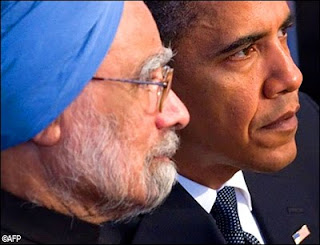India approaches US, willing to keep relations with Iran

India, whose energy demands grow every year, imports 350,000 barrels of oil per day from Iran and the trade turnover between two countries is about $13 billion per year (10 billion in the sphere of energy).
Also, India cooperates with Israel in the military sphere and with the United States in the nuclear. Thus, it is difficult to determine on which side Delhi is, although the country's activities over the past five years suggest that it is gradually moving closer to the United States, but at the same time trying not to lose Iran as an alley.
"Tehran has lost confidence in Delhi over the nuclear issue. We think that Delhi has taken a negative stance against Tehran," Deputy Chairman of the Iranian Foreign Ministry's Research Center Mohammad Bagher Khorramshad told Ilna news agency Feb.22.
Being a member of the IAEA board, India has so far voted for two resolutions against Iran.
The IAEA's new Secretary General Yukiya Amano prepared a report on Iran's nuclear program, which has been circulating in Western media before its official publication on the IAEA Web site.
The report pointed out that Iran is probably attempting to create nuclear warheads for the first time.
The report will be submitted for discussion to IAEA Board of Goverments' members in the near future.
Before India voted in favor of two resolutions related to Iran's nuclear program.
India is strategically important for the United States and U.S. Secretary of State Hillary Clinton underlined it in June 2009. During her Delhi visit, she met with Prime Minister Manmohan Singh and said that cooperation with India is one of the United State's main foreign policy priorities.
The volume of trade between the two countries amounted to $43 billion, which has increased by 25 percent since 2004. In 2007, the United States concluded a formal nuclear agreement with Delhi. Also, currently 9,000 Indian students study in U.S. universities.
Under pressure from Washington, India refused to participate in Peace gas pipeline project in 2007. The pipeline was designed to transfer Iranian gas to Pakistan and India.
Relations between Israel and India are quite favorable. Israel is the second largest arms supplier to India and it even trains the country's military personnel. The two countries cooperate in manufacturing of rockets, defense systems and high-tech military hardware.
Digər tərəfdən, İsrail Hindistana silah satışı baxımından ikinci yeri tutur və bu ölkələr arasında raket, müdafiə sistemləri, yüksək hərbi texnika və hərbi personalın təlimi üçün geniş əməkdaşlıq var.
In late 2007, India launched a space satellite, TechSAR, owned by Israel, which led to sharp protests from Iran. Earlier, Israel also shot a satellite, Ufug-1, in orbit, but TechSAR is more powerful and is able to work at night and in foggy weather.
India is a "newcomer" to the space market worth $2.4bln, where the country will compete with China, Ukraine, Europe and the United States.
Iran is the fourth oil producing country in the world with exports of 2.5 million barrels per day; 480,000 barrels to China, 350,000 barrels to India, the rest to Japan and other countries.
Iran is important for India not only in terms of energy, but also in terms of security. India has a consulate in the port of Abbas in southern Iran. It observes the Strait of Hormuz with the help of the port. About 60 percent of the world's oil is transported through this reservoir.
Pakistan and India fought each other three times over the past 60 years. Official Delhi has a consulate in Iran's Baluchistan province on the border with Pakistan, which monitors the country from the West.
The cause of the prolonged conflict between India and Pakistan is the province of Kashmir, which is claimed by both countries. If one takes into account the normal relations between Pakistan and Iran, India needs the support of Iran regarding the status of Kashmir.
In this regard, India signed a defense agreement with Iran in 2001. In 2003, the country held joint exercises in the southern waters of Iran (on the eve of the U.S. attack on Iraq). The countries held joint exercises in 2006 (on the eve of U.S. President George W. Bush's visit to Pakistan, India and Afghanistan).
In 1950, shortly after India gained independence, it signed a peace and friendship treaty with Iran. Despite this, relations between the countries over the past 60 years have been unstable.
For the first time after the victory of Iran's Islamic Revolution, Indian Prime Minister Narasimha Rao visited Iran in 1993. Iranian President Akbar Hashemi Rafsanjani visited India in 1995.
In 2001, President Mohammed Khatami and Prime Minister Vajpayee signed an agreement on cooperation in the sphere of defense.
India's strong defense of Iran looks unconvincing given such "turbulent historical relations."

Comments
Post a Comment